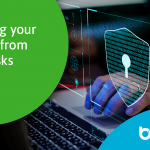When it comes to cybercrime, anyone can become a victim. Whether you’re a professional with confidential client information or run a retail store with EFTPOS machines, hackers can be pretty crafty and infiltrate most types of businesses.
In Part 1 of our guide, we take a look at the common types of cyber risks that SMEs face and the signs to look out for with potential scams.
Types of cyber risks
Cybercrime
Spotting a cybercrime can be harder than you expect with hackers becoming more sophisticated in their attacks. These are some of the common types of cybercrimes and what to be mindful of to prevent an attack.
Malware and Ransomware
What is it?
Malware tricks users into installing software that will allow the scammers to access your files and data. Ransomware attacks demand users pay to unlock their computer or in the face of other threats.
What to look out for:
- Be aware of unusual links or attachments in emails or social media messaging from unknown sources.
- Don’t open pop-ups on websites requesting to download files, software and programs.
Phishing Scams
Scammers will attempt to trick you into divulging personal information like credit card details or identity confirmation with a drivers licence or passport details. They will then use these details to access your data, especially bank accounts.
What to look out for:
- Be wary of emails requesting personal or banking details. While they may appear to be from a legitimate source, many scammers pose as financial and government institutions.
- If you receive a phone call or SMS from a financial or government institution requesting to verify and update your details.
- You receive an email or text requesting personal details with grammatical errors, such as the incorrect spelling of names and places.
If you would like to learn more on how to spot a cyber scam, Scam Watch has a list of educational resources with examples to help test your knowledge.
Data breaches
Even by taking all the right steps when handling personal or sensitive data, breaches can quickly happen. The Australian Government’s Office of the Australian Information Commissioner (OIAC) define a data breach as: when personal information is accessed, disclosed without authorisation or is lost.
With more data and information stored online every day, the risk of a data breach is something that can impact nearly all types of businesses. Let’s take a look at some examples of data breaches.
- Hackers access your customer database.
- Personal details sent to the wrong person, for example, an attachment containing a client’s health record is accidentally emailed to another client.
- Accidental loss or theft of a device containing sensitive information, e.g. accidentally leaving an office laptop in a taxi.
The impact of a data breach can cause distress to those involved as well as financial implications. Ensuring strong security measures are in place can help avoid a breach from occurring.
Preventing a data breach
These are some of the actions you can take to prevent a data breach from occurring:
- Update all security software across IT systems.
- Use strong passwords to access sensitive information.
- Do not open attachments on emails from unknown sources.
- Keep an inventory of your software and hardware assets. Having a list makes it easier to track the installation of anti-virus updates and to ensure no devices have been lost or stolen.
Get cover
Get insurance protection for your business today through BizCover. We offer a range of business insurance options to suit your business needs, including Cyber Liability insurance*.
Cyber Liability insurance* is designed to help protect you from claims and support your profitability in the event of a cyber breach or attack. Costs associated with defending a cyber claim are also covered.
Receive multiple quotes online or over the phone in minutes with a copy of your policy able to be emailed instantly.
*As with any insurance, cover will be subject to the terms, conditions and exclusions contained in the policy wording. The information contained on this web page is general only and should not be relied upon as advice


